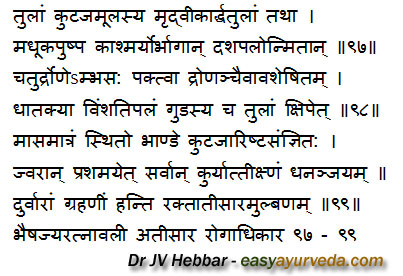Kutajarishta is a liquid Ayurvedic medicine, used in the treatment of diarrhea, dysentery, IBS etc. It contains 5 – 10 % of self generated alcohol in it. This self generated alcohol and the water present in the product acts as a media to deliver water and alcohol soluble the active herbal components to the body.
Table of Contents
ToggleReference
Bhaishajya ratnavali, Atisara – 97 – 99
Dose
12 – 24 ml. one or two times a day, usually advised after food.
If needed, it can be mixed with equal quantity of water.
With western medicines
Seek your doctor’s advice if you are taking this product along with other western (allopathic/modern) medicines. Some Ayurvedic herbs can interact with modern medicine.
If both Ayurvedic and allopathic medicines are advised together, then it is best to take allopathic medicine first, wait for 30 minutes and then, after a gap of 15 – 30 minutes, take Ayurvedic medicine or as directed by the physician.
Can this be used while taking Homeopathic medicine?
Yes. This product does not react with homeopathic medicine.
With supplements like multivitamin tablets, Omega 3 fatty acids etc?
Yes. Generally, this product goes well with most of the dietary supplements. However, if you are taking more than one product per day, please consult your doctor for an opinion.
How can dry grapes, which have a laxative effect, be used in Kutajarishta?
Uses
Kutajarishta is widely used in Ayurvedic treatment for diarrhea, dysentery, fever, bleeding disorders of intestine irritable bowel syndrome, Crohn’s disease, hemorrhoids. Strengthens digestive power.
Doctors also use this for the treatment of
Diarrhea, dysentery and Irritable bowel syndrome associated with antibiotic usage.
Traditional uses:
It is useful in all types of fever – Sarva Jvara
Useful in irritable bowel syndrome, malabsorption syndrome – Grahani
Useful in diarrhoea / dysentery with bleeding, Crohn’s disease, ulcerative colitis etc – Raktatisara
Watch video
Diet advice:
Drink plenty of water. Yogurt, rice, potato, blueberry, fenugreek seeds.
Avoid milk and dairy products, bran, cauliflower, cabbage, berries, green leafy vegetables, Celery, squash, beans, mushroom, oranges.
Side effects
There are no recorded side effects, however, a very high dose of Kutajarishta may lead to constipation.
Ingredients
Kutaja (Holarrhena antidysenterica)- Stem bark – 4.8 kg
Mridveeka -Dry grapes – 2.8 kg
Madhuka (Madhuca indica) – FLower – 480 g
Kashmari (Gmelina arborea) – Stem bark / root – 480 g
water for Kashayam – 49.152 kg, boiled and reduced to 21.288 liters
Guda – Jaggery – 4.8 kg
Dhataki (Woodfordia fruticosa) – flower – 960 g
Method of manufacturing:
Coarse powder of first four herbs is made, added with water, boiled to make Kashaya, reduced to specified quantity and filtered. To it, jaggery is added and dissolved, filtered and then Dhataki is added. Kept closed in a clean air tight container for one month time period for fermentation.
After a month, it is taken out, filtered and preserved.
Shloka- Sanskrit verse

Safe for kids?
It is safe to use this medicine in lower dose, in children above 5 years of age.
Pregnancy and lactation –
During pregnancy it is best to take only under medical supervision. Self medication during pregnancy should be avoided.
It can be taken during lactation period, under doctor’s advice, for a short period of time.
Manufacturers
Zandu, Sandu, Dabur, Baidyanath, Arya Vaidya Sala, AVP,
Nagarjuna – Kutajaarishtam
Expiry date: 10 years from the date of manufacture.
Storage: Store in a cool place in tightly closed amber colored bottle, protect from light and moisture.
Can Kutajarisht be given in children?
Yes, under medical supervision, it is commonly prescribed in children, in lower doses. Often it is mixed with water before administration.
Its taste is very strong and bitter. is there any other way to take it?
It can be mixed with equal parts of water, just before taking. This helps to mask the taste a bit.
Please consult your doctor before taking this medicine.
This article is written by Dr. Janardhana V Hebbar BAMS, MD (Ayu), PGDPSM, Managing Director, Easy Ayurveda Hospital.
It is reviewed by Dr. Raviganesh Mogra BAMS, MD (Ayu), Chief Medical Officer, Easy Ayurveda Hospital









88 thoughts on “Kutajarishta Uses, Dose, Side Effects And Ingredients”
For IBS, how long should it be taken ?
As advised by your doctor, it can be taken upto 4 – 12 weeks.
Sir mrudveeka (dry grapes) stimulats diarrhea no then how is it used in kutajarishta
It is used in the product to suppress hyperacidity and to relieve burning sensation, dry grapes balance Pitta. Kutaja, which is a very potent anti diarrheal, would suppress the mild laxative effect of Mrudweeka.
Because of this mutual effects, this product is ideal in cases of IBS with alternative loose and hard stools.
Hello madam , how to get rid of IBD , is this product helps ..what are the life style changes to do. Please help..
This product is useful in IBD. Read more about IBD remedies here – http://easyayurveda.com/2015/05/08/ibs-ayurvedic-treatment-home-remedies-lifestyle-tips/
for how many days has it to be taken
It can be taken from few weeks to few months of time.
For worms (including persistent ones like tapeworm, try the following :
Take a few fresh neem leaves. They can be identified by their light green colour. Mash them well and make balls of these (about 1 cm in diameter). For children below 12 yrs of age, give 1 ball every week in the morning after bowels. Adults may consume 2. But do not expect miracles after a single dose. This needs to be continued for at least a week.
Useful. Thanks for the tip. More neem benefits here – http://easyayurveda.com/2012/11/28/neem-in-ayurveda-benefits-usage-side-effects-full-reference/
it will definitely help you.
consult your Ayurveda doctor again and do what he advice.
it will definitely help in curing your IBS, you need not take this for life long.
IS IBS IS TOTALY CURABLE? AND HOW LONG I HAVE TO TAKE THIS MEDICINE?
if it is not older than 1 year it can be definitely cured completely. it may require 6-8 weeks of treatment.
is only kutajarista sufficient to treat amoebiasis?
no, it is safe only after 5 years of age, before that you have to follow your doctors advice.
Sir, You have mentioned Diarrhea as a symptom so it is Pitta dominant IBS. This type of IBS clinically shows the presence of heartburn, thirst, feeling hot, irritable or angry, inflammation, sweating and fever, fluid, and foul smelling stools and eructation.
The diet should include:
•The use of Buttermilk (takra) is emphasized.
•Indigestible foods such as bread; cheese; and cold, hard, and raw foods should be avoided.
Herbs like ginger, fennel, and cumin that stimulate enzyme secretions will improve digestion, absorption, and clear ama from the digestive tract.
•Prefered food items are Eat old rice, jawar, gourd, coriander leaves, lentil, green grams soup, black pepper, dried ginger, wood apple, Pomegranate, nutmeg, skimmed milk, buttermilk, hot water.
•Avoid foods items such as maize, barley, pigeon pea, pea, cow pea, black gram, gram, Soya bean, potato, sweet potato, onion, coconut, groundnut, chili, oily food, chicken, mango, pineapple, apple, watermelon, cashew, pumpkin gourd, papaya, fig, jack fruit
The following changes in lifestyle help to control IBS:
•Identify and remove food intolerances — Because grains are a common culprit, an elimination diet should be tried.
•Restore a healthy balance of bacteria in the gut -Use of buttermilk (takra) is emphasized.
•Mind–body therapy — Complete rest, adequate sleep is advisable and day sleep, awakening at night, tension, suppression of urges should be avoided.
The following herbs are used in this type of IBS for their respective benefits:
•Amalaki
•Coriander water cools pitta
•Musta (Cyperus rotundus) improves intestinal absorption and stops diarrhea.
•Aloe vera juice
•Guduchi (Tinospora cordifolia)
•Sweet, bitter, and astringent foods are best.
Do consult a doctor for the same. We can not prescribe medicines without seeing the reports, health, constitution .etc.,
Sir agar puri life isko piye to koi side effect .plz tell me sir
Hello Sir, No side effects have been recorded except if high dosage is taken it may lead to constipation.
Apple bhi ni khna kya mam..
Hello Sir, Research ke hisab se Apple me jo fructose (a sugar found in fruit) and sorbitol (an artificial sweetener) paya jata he vo aggravate karte he IBS symptoms ko. So, usko avoid karne ko bolte he.
How about cooked apples with cloves, cinnamon and nutmeg powder?
i thought it is good for breakfast.
It is not harmful in your case, if you are not diabetic. You may please continue taking it.
Sir mam .. 2year se main IBS se pareshan ho …plz help me …
Sir mare white aaw aur blood aa raha hai kya mai isko use kar sakta hu.
Krupaya doctor se direct consult keejiye.
पेट में कीड़े के क्या symtoms है
Bhook na lagna
pet me dard
vajan kam hona
Hi, senna powder would nullify the constipation effect of Kutajarishta. I suggest you to start with your doctor’s combination for 2 weeks time. If constipation increases, then drop kutajarishta.
Thanks Sir for replying.I have heard that IBS is not curable and it may return.Is ther anythig you suggest to take care of so that I can be completely cured from IBS.Thanks once again.
I cannot promise to cure IBS completely.
Sir, I recently knw that my brother is having a problem like that I just want to knw is this is sangrehni . He is having problem that when he eats food , immediately he have to bathroom
And what is the cure of this problem
My daughter (4 years ) has been adviced to take kutajarista, but its taste is very strong and bitter .
Can we add sugar or honey or lemon or any other thing to make taste good ?
You can add equal quantity of water plus a few drops of honey to it, before administration.
Hi, can you suggest a good medicine for worm infestation in kids
Can this medicine be taken for stomach pain? Please reply,
Thanks.
Thanks.
Does it improves liver function?
You will need to consult a doctor directly.
Hi, because Ayurvedic medicines have caused problems, in your case, better to stick to allopathic treatment protocol.
Hi sir
I am having gastroparesis and when I get up in the morning my throat is having lumps and my whole mouth is burning can’t eat any spicy and sometimes water also giving me burning in throat.
My stools also loose at times . Please give suggestions.
You can take this – for stomach and intestine related complaints.
Hi, all are similar. Please consult only one Ayurveda doctor and follow his advice at least for 2 months time. Do not consult many Ayurveda doctors at the same time.
Hello! Would you recommend this for someone with IBS-C? A doctor told me to take that, Bilvadi Leh, and to drink buttermilk. I’m lactose intolerant. Is buttermilk a little easier on the stomach than regular milk? I think my IBS-C messes with my bladder, I think I have interstitial cystitis now. I don’t know if IBS-C or intertstitial cystitis are my main issues and they aggravate each other or what. Do you have any recommendations for easing interstitial cystitis or do you think once I get my IBS-C under control my interstitial cystitis issues will ease up? I’m sorry for all the questions. I’m so ready to start feeling a little better. Thank you for reading my comment!
Sir, I have IBS C . I have to go bathroom six seven times since stomach is not cleared. Age 30yrs. Allopathic medicines tried. No symptom.
sir,
Which medicine is best for external non bleeding piles?Poothikaranjasavam of kottakkal or kutajarishta !!
SIR,
thanks! What is the defference b/w poothikaranjasavam and poothikavalkasavam?
Hi, they both are same, as per my knowledge.
Respected sir,
Thanks for ur reply! My humble pranams to you coz you are truly great&your blog being the Best one .May lord dhanwantari shower health ,wealth and success on you!!!
Namaste. Thanks and wish you the same 🙂
Hi,
I have SIBO and celiac disease. Fermentable foods produce gas and abdominal distension along with loose stools for me due to an imbalance of the gut bacteria. Will kutajarishra / kutaj ghana vati help restore the gut microbiome?
Kutaj Ghanavati can be more useful.
Kutajarishta is only for diarrhea and Abhayarishta is good for constipation
This is true.
You can alternate between the two during diarrhea and constipation respectively.
Thanks to Doctor JV Hebbar, he is guiding people in excellent words.
God bless you doctor and my regards to you.
Manoj Kumar
Muscat – Oman
is IBS is cureable ??\
Sir i feel always loose motion after consuming good. ..it’s very embarrassing ..it’s uncontrol …
Pls help me
Is there any medicine for chronic fatigue syndrome…i feel extremely tired all the time…with joint pains and very low enrrgy levels…hv nagging pain in the stomach
How good is Kutajarishta for Spurious diarrhea due to colorectal tumor?
Very useful.
General dose is 10 ml, mixed with 10 ml water, 2 times a day after food.
Dear Sir,
Many thanks for your prompt reply. I will test it.
Hello Doctor,
Is there any food that should be strictly avoid , i mean any pathya , while taking Kutajarishtam ?
Drink plenty of water. Yogurt, rice, potato, blueberry, fenugreek seeds.
Avoid milk and dairy products, bran, cauliflower, cabbage, berries, green leafy vegetables, Celery, squash, beans. beans, mushroom oranges.
Hello Doctor,
Is there any food which should strictly avoid, i mean any pathya, during consumption of Kutajarishta?
Drink plenty of water. Yogurt, rice, potato, blueberry, fenugreek seeds.
Avoid milk and dairy products, bran, cauliflower, cabbage, berries, green leafy vegetables, Celery, squash, beans. beans, mushroom oranges.
Sir i have swelling in appendix and my fictor suggest kutajarista along with liverex syrum.After use this i felt relieved but after two month again feel same problem.Now what to do
Sir is appendix is curable.
Better to consult a doctor directly
Sir Mebarid capsule is how much useful for Gastrointestinal treatment??
It is used for treating diarrhea and gastritis.
Is Kutajarishta useful in ACIDITY? Pls help
Yes, to some extent.
What is the duration of kutajarishta intake? How many days should I take this kutajarishta?
Depends on disease. Usually 2 – 8 weeks.
thanks .dr. very ueful information.
My motions are loose, undigested food grains are visible in stool, will kutajarista be useful in my case
I am diagnosed with IBD (irritable bowel disease) or IBS as you say and I have undergone the procedure of colonoscopy and endoscopy. Is it advisable to take the dose of kutjarist? If yes then how much? Please reply urgently.
Thank you!
Sir i have purchased this syrup in 2015 can i still us it in 2019
Dr..what is the quantity to be consumed and when??
Dose and timings are mentioned in the article. Please consult an Ayurveda doctor for further advice.
Can kutajarishta be taken along with Zandu Pancharishta…?
Yes.
Does this contain alcohol? As the use of any alcohol along with Metronidazole is strictly prohibited.
It contains 3 – 7% of self generated alochol but alcohol is not there in its free form. It is there blended with volatile oils and herbs.
For dysentery how long i have to use kutjarist dr?
It can be taken for as long as 4 – 6 weeks.